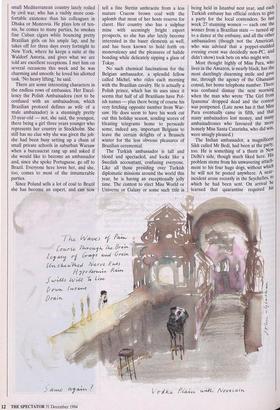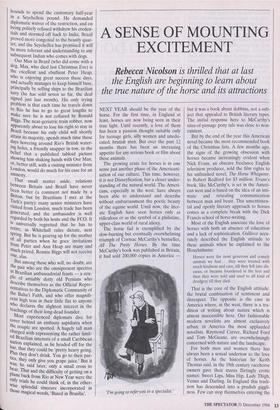HAVING A LOVELY TIME
Simon Winchester explains the pleasures
of the most enjoyable job in the world: ambassador of anywhere to Brasilia
Brasilia NEW YEAR'S EVE in Copacabana is a magical occasion which is not to be missed. Everyone who is anyone in Brazil dresses 11P in white and takes lighted candles down to the sea; there is much spirited drinking, and dancing goes on until the dawn gilds the Sugarloaf etc. etc.
But, for just this New Year's Day, the whole circus has to gird its hungover loins at ten in the morning and take whatever airline is available — Transbrasil, conve- nience-free Varig, a collection of contrap- tions known as VASP, or TAM with its onboard orchestra — and head for two hours up into the sunless uplands, for tin- sel and drums among Oscar Niemeyer's Stalinist monuments in the magnificently dull capital, Brasilia. For the tiresome truth is that the Brazilian government has made the decidedly unconvincing decision to inaugurate its new president, Fernando Cardozo, on 1 January. Except in an official capacity — when people say polite things about how good it is to see the Brazilians opting for a clean government this time — no one is looking forward to it at all. Dozens upon dozens of potentates are coming — the King of Tonga, Mr Al Gore, lots of sheikhs, even Mr Fidel Castro. Poor Michael Portillo has drawn our short straw, and has to fly out from home to attend on behalf of HMG. He may be less weary with wine than the Rio social set, but he too will doubtless wish privately that the whole affair had been timed rather more adroitly.
Still, the event is giving Brasilia's enor- mous diplomatic corps something stirring to do for once. One would not wish to sug- gest that the burdens of office weigh any less heavily on the members here than they do in Moscow, or Washington; a great deal of good work is no doubt being done by many of their number. But more typical is the life of His Excellency the Ambassador of — well, let us say — only a small Mediterranean country lately roiled by civil war, who has a visibly more com- fortable existence than his colleagues in Dhaka or Monrovia. He plays lots of ten- nis, he comes to many parties, he smokes fine Cuban cigars while bouncing pretty Brazilian girls on his ample lap, and he takes off for three days every fortnight to New York, where he keeps a suite at the Waldorf Astoria, and gives what we are told are excellent receptions. I met him on several occasions this week and he was charming and smooth: he loved his allotted task. 'No heavy lifting,' he said.
There are some interesting characters in the endless rows of embassies. Her Excel- lency the Polish Ambaixadora (not to be confused with an ambaixadress, which Brazilian protocol defines as wife of a male ambaixador) is a stunningly pretty 33-year-old — not, she said, the youngest, there being a girl three years younger who represents her country in Stockholm. She still has no clue why she was given the job: she had been busy setting up a chain of small private schools in suburban Warsaw when a bureaucrat rang up and asked if she would like to become an ambassador and, since she spoke Portuguese, go off to Brazil. Everyone here loves her, and she, too, comes to most of the innumerable parties.
Since Poland sells a lot of coal to Brazil she has become an expert, and can now tell a fine Stettin anthracite from a less mature Cracow brown coal with the aplomb that most of her hosts reserve for claret. Her country also has a sulphur mine with seemingly bright export prospects, so she has also lately become interested in the baser elements as well, and has been known to hold forth on monovalency and the pleasures of halide bonding while delicately sipping a glass of Tokay.
No such chemical fascinations for the Belgian ambassador, a splendid fellow called Michel, who rides each morning with the Brazilian cavalry. He is actually a Polish prince, which has its uses since it seems that half of all Brazilians have Pol- ish names — plus there being of course his very fetching opposite number from War- saw. He does seem to have his work cut out this holiday season, sending scores of bleating telegrams home to persuade some, indeed any, important Belgians to leave the certain delights of a Brussels winter for the less obvious pleasures of Brazilian ceremonial.
The Turkish ambassador is tall and blond and spectacled, and looks like a Swedish accountant, confusing everyone. Like all thosi prekding over Turkish diplomatic missions around, the world this year, he is having an excePlionally jolly time. The contest to elect Miss World or Universe or Galaxy or some such title is being held in Istanbul nest year, and each Turkish embassy has official orders to give a party for the local contenders. So last week 27 stunning women — each one the winner from a Brazilian state — turned up to a dance at the embassy, and all the other ambassadors (though not the American, who was advised that a poppet-studded evening event was decidedly non-PC, and didn't show) took bets on who might win.
Most thought highly of Miss Para, Who lives in the Amazon, is nearly black, has the most dazzlingly disarming smile and gave me, through the agency of the Ghanaian consul, her home telephone number. There was confused dismay the next morning when the man who wrote 'The Girl from Ipanema' dropped dead and the contest was postponed. (Late news has it that Miss Para eventually came in fifth, and that many ambaixadors lost money, and many ambaixadresses who favoured the more homely Miss Santa Catarinha, who did win, were smugly pleased.) The Indian ambassador, a magnificent Sikh called Mr Bedi, had been at the party, too. He is something of a thorn in New Delhi's side, though much liked here. His problem stems from his unwavering attach- ment to his four huge dogs, without which he will not be posted anywhere. A near- incident arose recently in the Seychelles, to ,which he had been sent. On arrival he learned that quarantine required his
hounds to spend the customary half-year in a Seychellois pound. He demanded diplomatic waiver of the restriction, and on being politely refused withdrew his creden- tials and stormed off back to India. Brazil proved more congenial to the beastly quar- tet; and the Seychelles has promised it will be more tolerant and understanding to any subsequent Indian who comes with dogs. Our Man in Brazil (who did come with a dog, Max, who died last Christmas Eve) is the excellent and ebullient Peter Heap, who is enjoying great success these days, and actually manages to keep himself busy, principally by selling ships to the Brazilian navy (he has sold seven so far, the deal signed just last month). His only trying Problem is that each time he travels down to Rio he has to go to great lengths to make sure he is not collared by Ronald Biggs. The near-geriatric train robber, now apparently about to lose his right to stay in Brazil because his only child will shortly attain its majority, spends much time these days hovering around Rio's British water- ing holes, a friendly snapper in tow, in the belief that a published tabloid picture showing him shaking hands with Our Man, or, better still, with a visiting minister from London, would do much for his case for an amnesty.
That small matter aside, relations between Britain and Brazil have never been better (a comment not made by a Briton, but by Brazilians I met at the Turk's party): many senior ministers have visited from London, much trade has been generated, and the ambassador is well regarded by both his hosts and the FCO. It is universally regretted that he has to retire, as Whitehall rules dictate, next spring. But he is gearing up for the mother of all parties when he goes: invitations from Peter and Ann Heap are many and much prized. Ronnie Biggs will not receive one, alas.
But among those who will, no doubt, are the pair who are the omnipresent spectres at Brazilian ambassadorial feasts — a con- Pie of amiably dotty old Persians who describe themselves as the Official Repre- sentatives to the Diplomatic Community of the Baha'i Faith, and who offer magnifi- cent high teas in their little flat to anyone Who declares the slightest interest in the teachings of their long-dead founder. Most experienced diplomats dive for cover behind an embassy aspidistra when the couple are spotted. A hugely tall man charged with representing the rather limit- ed Brazilian interests of a small Caribbean nation explained, as he headed off for the bar, that they could be 'pretty heavy going. his they don't drink. You go to their par- ties, they only give you grape juice.' But it Was, he said later, only a small cross to bear. That and the difficulty of getting on a plane back from Rio at New Year were the only trials he could think of, in the other- wise splendid sinecure incorporated in those magical words, 'Based in Brasilia'.




























































 Previous page
Previous page